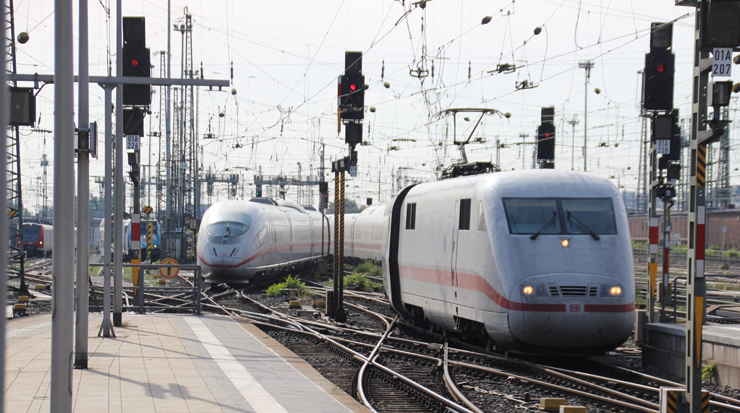
BERLIN — German national passenger rail operator Deutsche Bahn has dropped fares for intercity travel for the first time in 17 years, with a 10% on tickets for intercity travel of more than 31 miles (50 kilometers).
The lower fares reflect a decrease in the German government’s value-added tax on rail travel, from 19% to 7%, as part of climate-protection measures that took effect Jan. 1, the Guardian newspaper reports.
Deutsche Bahn will also lower prices on services such as the transport of bicycles.
While the long-distance fares are increasing, short-distance and transit fares are rising in many metropolitan areas.












What they need to do in Europe is to tax aviation fuel like diesel fuel. Maybe it will happen.
GUY – Of course I’m showing my age. I won’t say how many centuries ago I was in continental Europe riding Nederlanse Spoorwegen but it was true back then. (In the ensuing centuries I’ve only been in Britain, not the Continent.) When I was in Koningrijk Nederland the main lines were served multiple times an hour and the secondaries twice.
As I follow aviation as closely as rail I’m quite aware of the growth in short-haul aviation in Europe. I read about northern Europeans (Sweden, Britain, Germany) vacationing in Spain. I’m quite confident the rail share hovers close to zero even from nearby France.
In other news we read that the minor-league Foxboro(ugh) Fakes went down swinging yesterday. Those white DeLorean fire trucks must feel like they have flat tires. Next to go down (next week) will be my state’s Green Bay Slackers, the worst 13 – 3 team in the history of the galaxy, the team that slightly edged the Detroit Lions f/k/a Pontiac Pussycats last week but the Pussycats looked better.
Charles and Anna:
“A branch line in Europe is two trains an hour” is a bit optimistic. Some are down to one or two trains a day.
“are not competing with air travel”: Between Hamburg-München or Berlin-Frankfurt, air-rail competition is quite present.
This welcome change in DB IC fares applies only to trains running inside Germany.
“a train could (theoretically) barrel across two, three, four nations without stopping.” Quite so. Thalys trains run from Paris to Köln through France, Belgium and Germany. Eurostar London-Amsterdam services run in England, France, Belgium and The Netherlands. Other trains connect Germany, Austria and Hungary, etc.
DB’s move is the way to go, hopefully other European companies will follow. There is also a move to revive night trains, as ÖBB has been doing in recent years. And new train sets are used on the sleepers between London and Scotland. Between European cities and for distances of 500-1600 km, 300-1000 miles, flying could soon become anachronistic.
I believe Deutsche Bahn is owned by the German government and these intercity runs (e.g. 50 km and more) are not competing with air travel but with road traffic. Thus it can be seen as a social good to attract traffic from the road onto rail, and they can manipulate fares to do this.
It also applies to long-distance travel (which means something somewhat different in Europe than it does in North America) but this article is unclear if it applies to trips wholly on Deutsche Bahn or if it applies to international travel as well.
Remember, Germany is part of the Schengen Accord so there are no customs and immigration barriers in a very wide chunk of Europe, a train could (theoretically) barrel across two, three, four nations without stopping.
There is no need to discuss the environmental impact of mass air travel, it is well known. Enticing people out of their airplane seats and onto trains can only be a positive move. I wish them well.
The above comments are generic in nature and do not form the basis for an attorney/client relationship. They do not constitute legal advice. I am not your attorney. With one motor gone we can still carry on, coming in on a wing and a prayer.
ANNA –
A branch line in Europe is two trains an hour. A main line in Canada is two trains a week.
Proof read the item – incorrect last paragraph.
Editor: Please make last sentence make sense.
I believe it should read “While the long distant fares are “decreasing”, short- distance and transit fares are increasing.